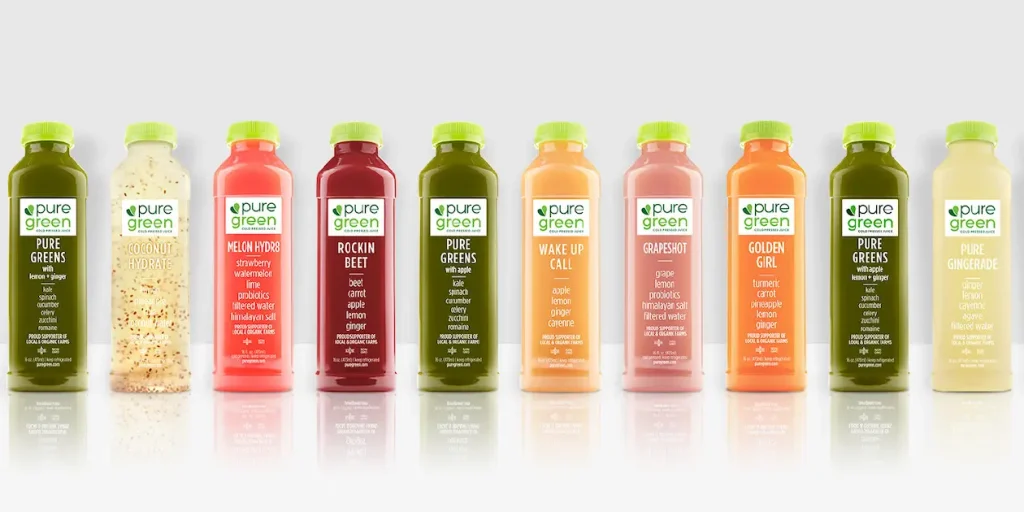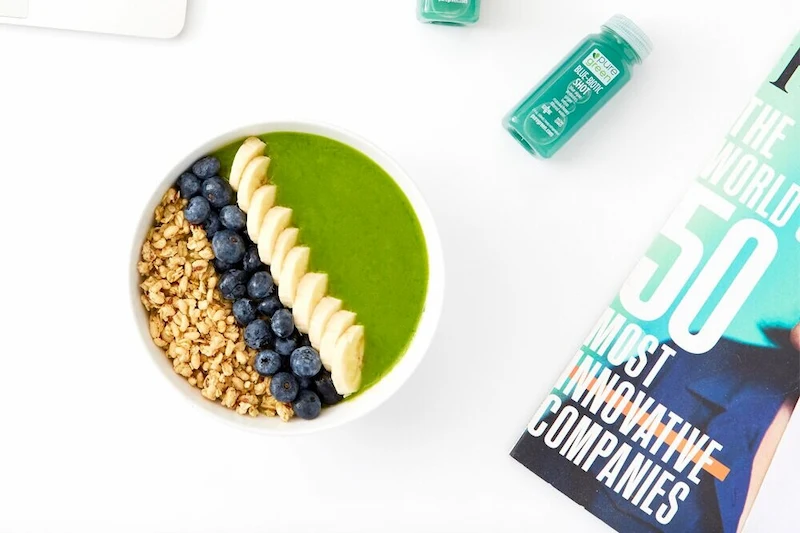If you are like us and juicing is a way of life, I’m sure you’ve heard about organic juices before. Praised for its health properties, 100% organic juice has been taking the world by storm, popular with influencers and athletes alike.
But just what makes organic juice organic? And is it really worth the hype? Read on to find the answers to these questions and more!
WHAT DOES ORGANIC JUICE MEAN?
Organic. It’s a word we all know. But what does it actually mean? Well, organic produce is produce that is grown according to organic farming practices. These practices are tightly regulated, but essentially means that produce is grown:
- Without harmful chemicals like pesticides.
- In soil that hasn’t been chemically treated.
- With eco and environmentally friendly practices in mind.
For things like meat and dairy, it also means that the animals have been raised in ‘natural’ conditions, this means:
- Without growth hormones.
- Without antibiotics.
- In environments that emulate the animals’ natural surrounds
The shift back towards organically grown food and its products started in the 1940s when farmers began to worry about just how many chemicals they were using to grow food. And it didn’t stop there.
The popularity of organic food has skyrocketed since the early 2000s, as public awareness about the dangers of chemicals used in conventional farming has grown.
And it still hasn’t slowed down. As more and more people are becoming health conscious about the benefits of organic eating there has been a boom in the industry. Now your options aren’t limited to just buying organic apples at the local farmer’s market.
More and more companies are switching to healthy, organic variants. From yogurts to wine, smoothies to chocolate, there are organic options for almost everything and everybody.
WHY ORGANIC JUICES?

HOW TO CHOOSE AN ORGANIC JUICE
Check Out the Back of the Bottle
Avoid Additives and Preservatives
Avoid juices that have any added preservatives or additives listed in the ingredients. A good rule of thumb is if you don’t recognize or can’t pronounce the word – you shouldn’t be putting it into your body. Quality, fresh organic juice won’t need to be loaded full of nasty additives.
Shop Local
We recommend wherever possible choosing organic juices sourced from local farms. Not only does it guarantee freshness, but you will also be supporting local farmers. That’s a win for everyone!
WHAT ELSE SHOULD I LOOK FOR?
Cold-pressed Organic Juice
Cold-pressing, which you can read all about here, is pretty much a super-advanced way of getting the delicious juice out of those fresh fruits and vegetables, without damaging the delicate vitamins, minerals, and nutrients with heat or oxidation. Cold-pressed juice, therefore, is the ultimate choice if you want to get the best benefits from your organic juice.
Unpasteurized Organic Juice
Similarly, we always recommend choosing unpasteurized juices. The pasteurization process, while necessary for things like raw milk, simply destroys a lot of the precious vitamins and antioxidants found in organically grown produce. Always check the information on the label, and go for the freshest juice possible. Ask at your local juice bar or grocery store if you have any doubts about your juice.
WHY SHOULD YOU DRINK ORGANIC JUICE?
Rich in Antioxidants
Organically grown fresh produce is proven to be much, much richer in antioxidants than its traditionally grown counterparts. Studies on the antioxidant concentrations in fresh produce have shown that fresh organic fruit and vegetables contain around 20-40% more antioxidants! This huge jump is attributed to the plant’s need to enhance its immune functioning to defend itself against pests. Regardless, antioxidants have a wide range of health benefits, and choosing an organically grown juice rich in antioxidants can help your body in several ways.
- Antioxidants:
- Fight against the signs of aging
- Neutralize free radicals
- Protect against cell damage
- May prevent the risk of heart disease or cancer
Alkalizes Your Body
Reduce Pesticide Exposure
Conventionally grown food – anything not organic – is subject to a lot fewer rules and restrictions regarding how the plant is grown and the entire agricultural process. Organic produce is grown with natural processes in mind, and an emphasis on organic farming methods and environmentally friendly processes.
What this comes down to though is the chemicals used to artificially promote growth. Think about it – ‘normal’ crops are created with genetically modified plants, designed to produce the largest fruit possible or to be genetically resilient to chemicals like weedkillers. They are grown using chemically boosted fertilizers and treated soils. The fresh fruits and vegetables are sprayed with dangerous and toxic pesticides, to kill pests such as insects, fungus, and weeds. While these practices have been deemed safe by regulatory bodies, organic food completely forgoes the need for dangerous chemicals and toxic pesticides altogether.
Organically grown food shuns these chemicals and relies upon natural farming methods and means of keeping pests down – things like crop rotation and hand weeding. Sounds a bit more appealing, doesn’t it? And the studies show that conventionally grown produce, even after it’s cleaned, still carries a much higher risk of containing pesticide residues.
If you’re like us and want to reduce your and your family’s risk of pesticide exposure, it’s clear that selecting organic produce – and products made of 100% organically grown fruit and vegetables is the better option.
Is Organic Juice Healthy?
So, it’s fair to say that organic juice is by far the healthier choice for you and your family. If you are looking to reduce your pesticide exposure, up to your antioxidants, or avoid baddies like additives and preservatives, healthy organic juice is definitely the way to go. Just remember – because it’s loaded full of fresh organic fruits and vegetables the serving size of organic juices might be smaller than you expect.
Always check on the bottle to make sure you are getting the recommended dose. It’s also important not to overdo it – unless you are taking an organic juice cleanse, of course. Juices are highly concentrated and may have more sugar in the form of fructose than you expect.
If you are worried about your sugar intake a healthy green juice made from fresh organic veggies like spinach and kale is definitely the way to go.
Where can I get 100% Organic Juice?
As organic juice is becoming more and more popular it’s also much easier to find than it used to be. Juice bar franchises are popping up all over the country and larger grocery stores these days have a pretty wide range of organic juices.
You can even order organic cold-pressed juice online from our store and have it delivered straight to you! So, what’s stopping you? Jump aboard and pick up a healthy 100% organic juice today!






